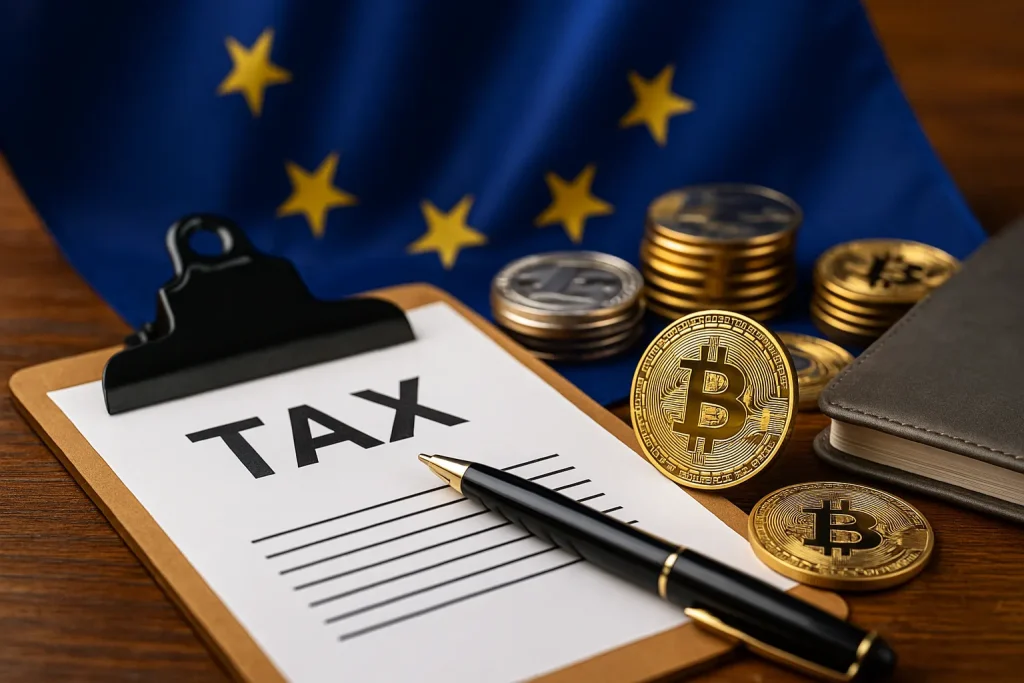
Cryptocurrency and Taxes: Declaring Income in France and the EU
Cryptocurrencies have become a prominent element in the European financial ecosystem, yet many individuals remain uncertain about how to handle taxation. France and the European Union have taken significant steps towards regulating this area, obligating crypto holders to declare their earnings. In this article, we will delve into how to properly declare crypto income in France and across the EU in 2025, ensuring compliance and avoiding penalties.
Tax Obligations for Crypto Holders in France
In France, tax legislation requires individuals to report income generated from buying, selling, or exchanging cryptocurrencies. If you are considered a casual investor, capital gains are taxed under a flat rate regime known as the “PFU” (Prélèvement Forfaitaire Unique), which imposes a 30% tax—12.8% income tax and 17.2% social contributions. However, frequent trading or receiving crypto as payment may lead to classification under professional income.
Crypto assets must also be reported even if no transactions took place. Anyone holding accounts on foreign crypto exchanges must declare them via Form 3916-BIS. Non-disclosure can result in fines of up to €1,500 per unreported account or €10,000 if the platform is in a non-cooperative jurisdiction.
Moreover, the conversion of cryptocurrency to fiat (euros, for example) is a taxable event. If a user exchanges crypto for another crypto, it is not taxed immediately, but must still be recorded to compute future gains or losses when eventually converted to fiat.
When and How to Declare in France
Declarations must be made annually, typically by mid-May through the French tax authority’s online service. Taxpayers should include Form 2086 for capital gains calculations. It requires detailed information for each taxable transaction, including acquisition date, sale date, quantity, and gains.
It is strongly recommended to maintain a record of all transactions throughout the year using specialised tools or spreadsheets. French authorities are increasingly collaborating with foreign exchanges, so it’s becoming harder to omit undeclared income without risk.
Late declarations or errors may result in a 10% late payment penalty, which can rise to 40% in the case of deliberate omission, along with late interest fees of 0.2% per month.
EU-Wide Tax Rules and Common Frameworks
Within the European Union, the tax treatment of cryptocurrencies varies between countries, though efforts are being made to harmonise regulation. The most significant development is the Markets in Crypto-Assets Regulation (MiCA), which entered into force in June 2023 and will be fully applicable by the end of 2024.
MiCA focuses on market transparency, consumer protection, and anti-money laundering, but indirectly influences tax compliance by requiring licensed service providers to maintain detailed transaction records. This data may be shared with tax authorities under DAC8, a directive extending EU tax transparency rules to digital assets starting in 2026.
EU residents must report crypto income under their national frameworks for now. Some countries, such as Germany, exempt long-held crypto assets (over one year) from tax, while others like Italy and Spain require declaration regardless of holding period. Cross-border discrepancies mean that moving residence or trading across borders can affect tax obligations significantly.
Understanding DAC8 and Its Impact
DAC8, formally adopted in October 2023, will require crypto service providers operating in the EU to report user transactions to national tax authorities, similar to the CRS system for banks. Although it applies from 2026, investors should prepare by ensuring accurate records now.
For example, if a French resident uses a German exchange, the latter will be obliged to report user activity to the French tax administration. This will drastically reduce anonymity and non-compliance opportunities within the bloc.
Even before DAC8’s implementation, voluntary transparency is advised. If discrepancies arise between your records and platform-reported data, authorities are likely to follow the latter, making it essential to retain precise, timestamped records.

Common Challenges and Best Practices
Many crypto investors find tax rules complex, particularly regarding valuation, foreign exchange rates, and transaction classifications. Errors commonly arise from underreporting, misclassifying tokens (e.g. stablecoins vs altcoins), or overlooking staking and airdrops.
In France and many EU countries, staking income and rewards from DeFi protocols are generally taxable. However, classification may vary—as capital income, professional income, or miscellaneous gains—depending on the nature and frequency of activity.
To avoid complications, consider using automated tax software integrated with exchanges and wallets. These tools calculate gains using FIFO, LIFO, or specific identification methods, aligning with tax rules. For high-volume traders or DeFi users, consulting a certified tax adviser familiar with crypto legislation is strongly advised.
Preparing for the 2025 Tax Season
Begin by aggregating all crypto transaction data from January to December 2024. Reconcile exchange records, blockchain explorer data, and wallets. Identify any realised gains from sales, swaps, or income from staking and lending.
Use Form 2086 (France) or its national equivalents elsewhere in the EU to report transactions. Attach any additional declarations required for foreign accounts or professional income status. Be transparent—undeclared income may trigger audits or penalties.
Lastly, monitor legislative changes. The EU crypto tax landscape is evolving quickly, and staying informed ensures compliance and peace of mind. Following official guidance from national tax authorities or the European Commission can prevent costly missteps.





